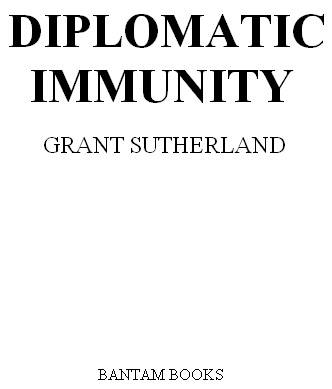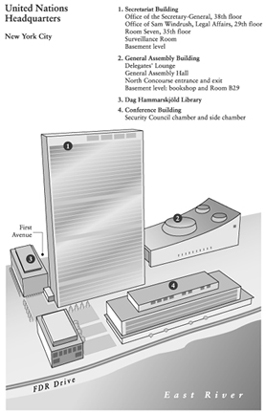Diplomatic Immunity


| Diplomatic Immunity |
| Grant. Sutherland |
| Australia/USA |
| (2001) |
regulations usually accorded by international law to diplomatic agents
--
Merriam-Webster's Third New International Dictionary of the English
Language
Robert Ludlum comes a riveting tale of intrigue that takes us right into
the heart of the United Nations. Here conscience and loyalty will
collide in one man's desperate race against time, when the clock starts
ticking on page one and never lets up. Shock ripples through the UN at
the stunning news: a special envoy has been found murdered in the
basement.
friend couldn't be more devastating. Years ago a personal tragedy bound
the two men together, and now Sam is determined to find the killer --
despite intense pressure to abandon the investigation. The murder has
cast uncertainty on the outcome of a high-stakes General Assembly vote,
and the last thing UN officials want is more controversy. Suddenly Sam
is up against roadblocks -- created by everyone from his supervisor and
foreign ambassadors to his lover -- and everyone has an agenda to
protect. The worst is yet to come.
coincidences: security cameras turned off for maintenance, a press corps
member who knows too much, the suspicious activities of the victim
himself, and a hushed-up review of a special committee. He has a score
of suspects, but each one is protected by diplomatic immunity. Each one
can escape justice.
investigation away from Sam and hand it to the NYPD. In less than a week
his fourteen-year career will be on the line. And as time runs out he
will face an even greater threat. Someone has found a new suspect. A
suspect not protected by diplomatic immunity. The only suspect Sam wants
to eliminate but cannot. Taking readers behind the scenes of privilege
and power to a place where the smallest actions affect the entire
world,Diplomatic Immunityis a mesmerizing new thriller from an author
whose name every suspense fan will need to know.

“The most dangerous of all moral dilemmas: When we are obliged to conceal the truth in order to help the truth be victorious.”
—Dag Hammarskjöld, United Nations Secretary-General,
1953–1961. Died in a plane crash while on a UN mission to the Congo. The cause of the crash was never determined.

PROLOGUE
O
N MANHATTAN ISLAND BY THE EAST RIVER THERE
are eighteen acres that are not legally part of the United States. This fact was impressed upon me throughout the first week of my induction, but acquired the force of reality only when I was called upon to pledge allegiance to a charter that was not the U.S. Constitution and to a flag that was not my own.
After the ceremony that year, the Secretary-General invited me and my fellow inductees up to his private dining room for drinks on the thirty-eighth floor. He made a speech.
“You have come here from many lands to dedicate your working lives to the service of all nations,” he proclaimed, sweeping his hand regally to embrace us, the newest and lowliest members of his team.
Twenty-two of us, as I recall. Three, like me, U.S. citizens, the others from all quarters of the globe. And all gathered to join the great United Nations enterprise, to aid the downtrodden of the earth, to build bridges of trust between nations, and to free mankind from the scourge of war.
The Secretary-General was eloquent. He painted the big picture. Duty. Responsibility. Hope. The greater good of mankind. A practiced politician, though I did not see it at the time, he offered us the words we wanted to hear. I was twenty-six, my fellow inductees mostly younger, each of us playing at being maturely levelheaded but underneath that, burning, lit with personal ambitions and universal ideals that seemed not only compatible but inseparable, as if the world’s good was somehow at one with our own. We were united too, of course, by youth’s universal belief—the evidence for which was all around us—that our parents’ generation had screwed up badly; that we could do better; that, given a chance, we could build a finer world.
I sat by the window. The view from the thirty-eighth floor was splendid.
“Each of you has a part to play, a real part in this endeavor. To serve all nations. All nations. Not merely your home countries. Not even that greater number, those nations with which you feel some affinity, some tie of culture or language or race. But all nations. Those with whom you agree and those with whom you disagree. Those which you believe good and those which you believe bad. Once accepted by the General Assembly, once a signatory to the UN Charter, each state has a legitimate call on the services of the Secretariat.” His hand swept over us again, not regally now but inclusively. “On me. And on you.”
Then he put on his glasses. And he opened the UN Charter, a red morocco-bound copy, which he held in one hand.
“You have undoubtedly heard this several times these past few days. It will do you no harm to hear it again.” His smile was wry, our laughter dutiful. But when he looked down and began to read, his grandiloquent and somewhat showy manner of address fell away. His tone became dry, almost professorial. And though we had as he surmised heard Article 100 of the Charter frequently during the course of our induction, we listened. Attentively.
“‘In the performance of their duties the Secretary-General and the staff shall not seek or receive instructions from any government or any other authority external to the Organization. They shall refrain from any action which might reflect on their position as international officials responsible only to the Organization.’”
He closed the morocco-bound copy. “The Secretary-General and the staff,” he intoned. He removed his glasses slowly. He looked up. “Me,” he said. “And you.”
A weight seemed to settle over the room, a moment of pure silence. And at that moment we were not merely young, ambitious men and women embarking on careers as international civil servants; at that moment we were acolytes, novitiates of a secular order, receiving final instruction from the high priest of our faith. A final warning. We would be leaned on. Attempts would be made, through us, to subvert the UN’s high ideals.
Then the Secretary-General raised a hand. And smiled somewhat equivocally.
“Good luck,” he said.
ELEVEN YEARS LATER
W
hen Toshio Hatanaka called, I was alone at my desk. I picked up the phone and said my name, then listened to the crackling coming down the line.
“Windrush,” I said again, louder this time. “UN Legal Affairs.”
The distant crackle continued. I was on the point of hanging up, when I heard a voice calling forlornly into the ether. “Sam?”
There are not many voices I would recognize under those conditions—just family and maybe three or four colleagues and friends—and I guess it says something about how close I’d become to Toshio over the years that I picked out his voice immediately. Smiling, I kicked back in my chair.
“I can’t hear you, Toshio. Speak up.”
The line broke up again, Toshio’s fragmented words reaching me faintly, like some indecipherable code. I’d held more than a few of these conversations with Toshio since he was appointed UN special envoy to Afghanistan. He spent half his life in places where a portable satellite-telephone was not a luxury item but a piece of equipment as essential as a four-wheel drive or a guard with a gun.
“Sam.” His voice emerged from the static. There was some more that I missed, and then, “Abatan.”
I took up my pen. Abatan was one of the UN-controlled refugee camps on the Pakistan border, a place to which we had recently sent out a relief medical team. One of the relief doctors, on sabbatical from her real job in New York, was my wife. I asked Toshio what the team needed, what inevitable bureaucratic and quasi-legal hassles they were having that I, as first deputy of UN Legal Affairs, could help straighten out.
“No,” he said. “Can’t contact—” And then the line faded.
I told Toshio I was losing him; I asked him again to speak up. His voice suddenly crested.
“The tribesmen went to Abatan. Into the camp.”
My pen froze over the notepad. The Afghan tribesmen should not have been anywhere near the camp; the Pakistani military guaranteed us full security.
“Who do you want me to speak to, Toshio? The Pakistani ambassador?”
For several seconds there was only static on the line, audio waves swelling, then receding. “Toshio?”
“I will find them,” he said. “I will contact them.”
“Who?” The Pakistani military? The Afghan tribesmen? I could hear the concern in his voice. Something was not right. I dropped my pen, then rose from behind my desk. “Who do you have to find? What’s going on out there?”
“Medical team,” he said, his voice breaking up. “Hostages.”
The line faded, crackled like gunfire, and was gone.
TUESDAY
